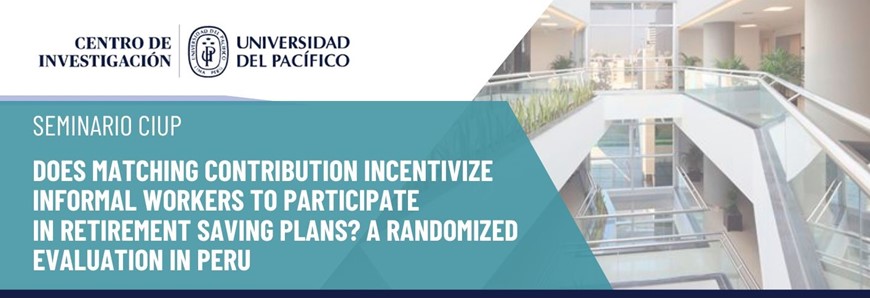

Autores: Noelia Bernal, Sebastian Galiani, and Oswaldo Molina
Resumen
Two thirds of the world’s employed population do not save for retirement. This occurs mainly in settings with largely informal labor markets, such as those in Latin America. Thus, the analysis of incentives to promote savings for retirement to prevent old-age poverty among these workers is crucial, especially in the current quick-aging context. We conducted a large field experiment in Peru on these workers and studied whether offering them a matching contribution can raise participation and contributions in the Individual Retirement Accounts. We had three groups: a control group receiving no match, and two treatments groups receiving 50 and 100 percent match, respectively. The results were as follows. First, the match incentive increases participation. Workers in the 50 and 100 percent match groups show participation rates of 5.2 and 6.5 percentage points higher than workers in the control group, respectively. Second, the 100 percent match incentive was effective in increasing savings. Among all individuals, the incentive rises the probability of contributing at least once in 1.4 percentage points, and conditional on enrollment, it increases this probability in 7.6 percentage points. Third, more interestingly, the 100 percent match rate also rises the probability to contribute after the matching period (six months) and saving amounts. On the other hand, the 50 percent match shows no effect on savings.
Expositor
Profesora asociada del Departamento de Economía de la Universidad del Pacífico. Tiene un Ph.D. en Economía y un Master en Economía y Financiamiento del Envejecimiento, ambas por Tilburg University, y es Bachiller en Economía por la Pontificia Universidad Católica de Perú. Sus áreas de investigación son en economía de la salud, mercados laborales, economía de las pensiones y economía pública. Sus investigaciones exploran temas como el impacto de la expansión de seguros subsidiados de salud en los trabajadores informales, los efectos de las pensiones no contributivas en variables de salud de las personas mayores pobres, la relación entre la informalidad de los mercados laborales y el ahorro financiero y previsional utilizando experimentos y economía del comportamiento, entre otros. Posee publicaciones en revistas de prestigio internacional y cuenta con experiencia como consultora del BID, CEPAL y asesorando a gobiernos de Perú y países de América Latina y El Caribe en temas de pensiones y laborales.
Copyright 2019 - Centro de Investigación de la Universidad del Pacífico